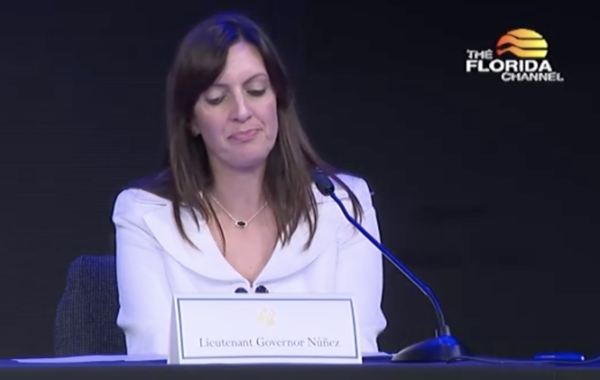


Florida Gov. Ron DeSantis has made headlines by introducing bills pushing conservative values. They’re bills designed to make an impact while he’s governor, in a state where Republicans have supermajorities in both legislative houses.
He’s sought to crack down on illegal immigration, toughen libel laws, protect teachers and students, roll back woke ideology from college classrooms, unclog the state’s fast-growing traffic, cut taxes, and even protect Floridians’ right to use gas stoves.
All that gets him favorable publicity as he considers a presidential run he seems likely to make.
He’s showing himself as a strong governor in a large and diverse state, not afraid of a fight, willing to use his clout to make far-reaching changes, and able to get it done.
There’s one bill that doesn’t exist yet that everyone’s thinking about. Experts are sure it’s coming, but hardly anyone talks about it. It’s the bill that would change Florida law so DeSantis won’t have to resign as governor—which state law now requires him to do—if he runs for president.
Florida Statute 99.012 (4)(a) states: “Any officer who qualifies for federal public office must resign from the office he or she presently holds if the terms, or any part thereof, run concurrently with each other.” The law goes on to state that resignation is irrevocable.
If DeSantis resigned, Lt. Gov. Jeanette Nunez would succeed to the office.
What’s less clear is when DeSantis would have to resign if the law isn’t changed. He would have to submit his resignation “at least ten days before the first day of qualifying for the office he or she intends to seek.” It would be effective no later than the earlier of two dates—the date he would become president if elected or the date his successor as governor would be required to take office.
There’s a lot of ambiguity in that, political scientists say. For most offices, the qualifying deadline is a single deadline, says Susan MacManus, professor emeritus at the University of South Florida. Floridians running for governor, as DeSantis did last year, or for federal offices such as Senate or Congress, had to qualify by June 17, 2022. Someone with a conflict would have had to resign ten days before that.
But someone running for president first runs in a host of primaries in other states. MacManus agreed Florida’s law might not require DeSantis’s resignation until ten days before he first qualifies for a primary.
Aubrey Jewett of the University of Central Florida said DeSantis could push the deadline even further if he argues that seeking a party’s nomination is not the same as running for “office.” Under that scenario, Florida law wouldn’t require him to resign until he, assuming he won the Republican nomination, qualified for the November 2024 general election.
“There’s some ambiguity, if the law doesn’t change, when Governor DeSantis would be required to file his resignation,” Jewett said. “It’s confusing.”
A lawyer specializing in federal and state law, Jon McGowan told The Associated Press the same thing. “There’s too much ambiguity.”
The date of New Hampshire’s 2024 primary, traditionally and by state law the first in the nation, hasn’t been established yet. The national Democratic Party wants to oust the state from that position and shake up its primary schedule. Still, New Hampshire is resisting, and the Republican party prefers the current status.
That primary has historically been early in February. In 2020, it was held on Feb. 11, with a filing deadline on Nov. 15, 2019. So, assuming New Hampshire has the same qualifying period as in 2019, DeSantis would only have to resign ten days before a date sometime in mid-November.
Florida’s law has changed a couple of times. It existed in its current form before 2007, Jewett said. That year, it was altered to allow sitting officers to run for federal office without resigning. The legislature acted for the benefit of Charlie Crist, then a popular Republican governor—he has since changed parties as a vice-presidential hopeful for the 2008 election. John McCain later picked Sarah Palin as his running mate instead.
The changed law also allowed Marco Rubio to run in the Republican presidential primaries in 2016 without resigning, Jewett said.
The legislature changed it back in 2018, Rick Scott’s last year as governor, Jewett said. “This loophole was created when Charlie Crist was in office, and in retrospect, they decided it was a mistake.”
The law is mainly designed to avoid the expense of the special elections needed to fill the vacated office—a resignation that can have a cascading effect, as politicians lower down the totem pole resign their seats to run in the special election, Jewett said.
Jewett and MacManus both said the Republican-controlled legislature will likely pass a bill changing the law again.
Only a few Republicans have spoken against the idea, saying they prefer DeSantis to remain as governor. Those Republicans, including Palin, GOP activist Laura Loomer, and former state Rep. Anthony Sabatini, have tended to support former President Donald Trump, who has already announced his candidacy, MacManus said.
“To be on that side going into the legislative session would not be a good idea if you want to get your bills through,” she said. “There are not a lot of legislators who are going to back (DeSantis). That’s the bottom line.”
Jewett agreed that DeSantis is formidable, not someone a legislator wants to pick a fight with. He’s been known to go after adversaries like the Disney company, whose special self-governing status the state has taken away. And DeSantis suspended Andrew Warren, a Democratic State Attorney in Hillsborough County after Warren said he wouldn’t enforce specific laws.
“Republicans don’t want to cross him. It could come back to haunt them, particularly in a primary,” Jewett said. “But I don’t want to overplay that. A lot of it goes back to, he’s really popular, and a lot of Republicans in the legislature like Ron DeSantis. They think he’s good for the party and good for policy.”
“He’s perceived as the head of the Republican party in Florida. He has high popularity within GOP circles across the country and in Florida, and he has so much money.”
Any Republicans opposed to DeSantis in the legislature don’t have the votes to stop the law change if it’s introduced, MacManus said.
Jewett said that if legislators move to change the law, it will probably come near the end of the session. DeSantis can keep his focus on, and be seen keeping his focus on, the state’s business during Florida’s 60-day legislative session. And he’ll delay announcing his candidacy in the meantime.
“Wide speculation is that he wants to wait until the legislative session is over,” Jewett said.
The Republican National Committee recently announced that the party’s first presidential debate would be in Milwaukee in August. So far, only Trump, Nikki Haley, the former South Carolina governor and U.N. Ambassador, and entrepreneur Vivek Ramaswamy have declared their candidacies.
DeSantis is among several prominent Republicans expected to announce, including Sen. Tim Scott (R-S.C.), former CIA Director and Secretary of State Mike Pompeo, and former Vice President Mike Pence.
MacManus said that DeSantis has numerous reasons to declare candidacy later rather than sooner.
Some candidates face pressure to do so before potential donors or campaign staffers commit to other candidates. Neither applies to DeSantis, who has already raised a lot of money, and whose 2022 campaign staff is being paid by the Republican party.
Neither does he need to declare to build excitement and enthusiasm, Jewett said. “He’s not hurting for those. He could wait until much later in the cycle if he wants to, and not hurt his chances.”
Waiting also puts off his becoming even more of a target than he already is for hostile media or opponents.
“Trump is already hammering away at him peripherally. Coming after him with nicknames and highlighting negative things on Truth Social,” Trump’s social media outlet, Jewett said.
“But because DeSantis is not actually in the race yet, he hasn’t gotten both barrels of Donald Trump. Once he’s in the race, I presume that will happen. So that might be a reason to stay out longer—to say out of Trump’s sights longer.”





